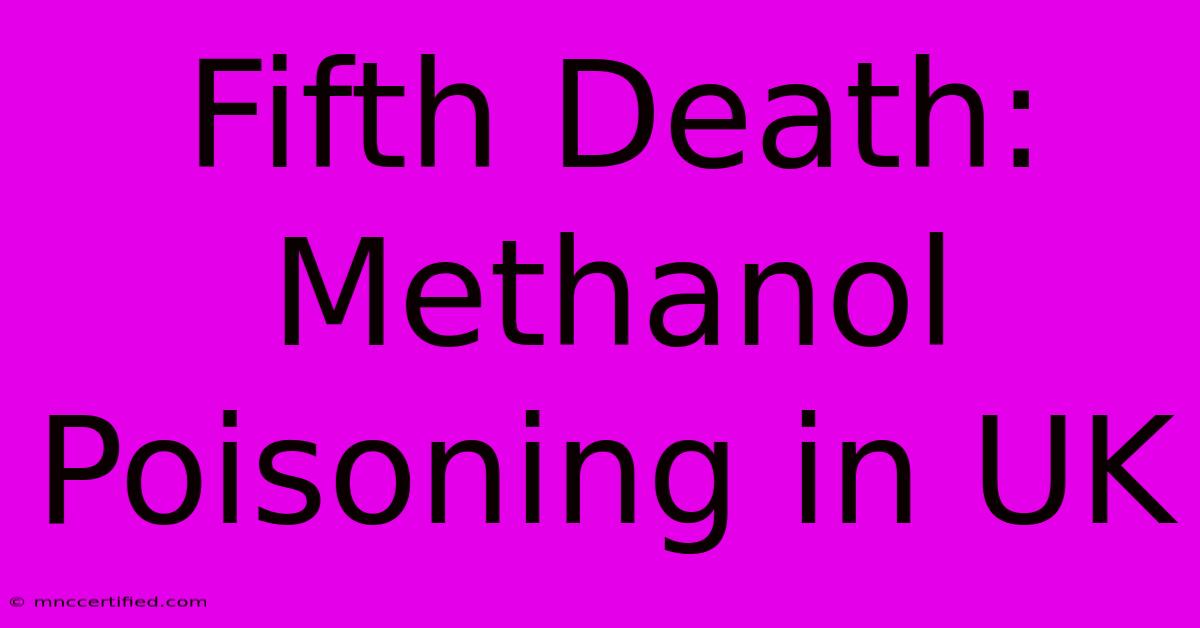Fifth Death: Methanol Poisoning In UK

Table of Contents
Fifth Death: Methanol Poisoning in the UK - A Growing Concern
The recent fifth death attributed to methanol poisoning in the UK has sparked widespread concern and highlighted a critical public health issue. This tragic event underscores the severe dangers of methanol ingestion and the urgent need for increased public awareness and stricter regulations. This article will delve into the specifics of this recent tragedy, explore the dangers of methanol, and discuss preventative measures.
Understanding the Dangers of Methanol Poisoning
Methanol, also known as methyl alcohol or wood alcohol, is a highly toxic substance. Unlike ethanol (the type of alcohol found in alcoholic beverages), methanol is metabolized by the body into formaldehyde and formic acid, both extremely poisonous. These substances can cause severe damage to various organs, including the:
- Eyes: Leading to blindness or permanent visual impairment.
- Brain: Resulting in neurological damage, seizures, and coma.
- Liver and Kidneys: Causing organ failure.
- Cardiovascular System: Potentially leading to heart problems.
Even small amounts of methanol can be lethal, and the symptoms can be delayed, making diagnosis and treatment challenging. Early symptoms might include headache, nausea, vomiting, and abdominal pain. However, these can quickly progress to more serious complications, including blindness, respiratory distress, and ultimately, death.
The Fifth Death and its Implications
The recent fifth death linked to methanol poisoning in the UK represents a significant escalation in this public health crisis. While the exact circumstances surrounding each case may vary, the common thread is the ingestion of contaminated alcohol products. This points to a worrying issue with the supply chain and the need for enhanced quality control measures for alcoholic beverages sold in the UK. Authorities are investigating the sources of the contaminated alcohol to prevent further tragedies. Identifying the source is crucial to preventing future poisonings.
Current Investigations and Governmental Response
The UK government, alongside health authorities and law enforcement agencies, is actively investigating the sources of the contaminated alcohol. This includes tracing the supply chain, testing various products, and working to identify any patterns or commonalities between the affected individuals. The response also includes increased public health messaging aimed at educating the public about the dangers of methanol and advising them on how to identify potentially unsafe alcohol products. Stronger regulations and stricter penalties for those involved in supplying contaminated alcohol are also being considered.
Preventing Methanol Poisoning: What You Can Do
While the investigation continues, individuals can take steps to mitigate their risk:
- Only purchase alcohol from reputable sources: Avoid buying alcohol from unregulated sources, such as unlicensed vendors or online marketplaces where product authenticity cannot be verified.
- Check the labels carefully: Look for any signs of tampering or inconsistencies on the label.
- Be wary of unusually low prices: If the price of alcohol seems too good to be true, it probably is.
- Trust your instincts: If something seems off about the alcohol, don't consume it.
Reporting Suspicious Products: If you suspect that you have purchased contaminated alcohol, report it immediately to your local authorities. Reporting suspicious products is vital in preventing further incidents and protecting public health.
Conclusion: A Call for Vigilance
The fifth death from methanol poisoning underscores the critical need for ongoing vigilance and proactive measures to prevent further tragedies. Increased public awareness, stricter regulations, and robust investigations are all essential steps in tackling this growing public health concern. By working together, we can help protect the public from the devastating consequences of methanol poisoning. The ongoing investigation is crucial and everyone should remain informed about updates and warnings from official sources.

Thank you for visiting our website wich cover about Fifth Death: Methanol Poisoning In UK. We hope the information provided has been useful to you. Feel free to contact us if you have any questions or need further assistance. See you next time and dont miss to bookmark.
Featured Posts
-
28 Year Old Brit Dies Methanol Poisoning Suspected
Nov 22, 2024
-
Small Business Insurance Ontario
Nov 22, 2024
-
Snowflake Shares Surge On Positive Forecast
Nov 22, 2024
-
Oura Ring Gen3 Deal 249 Today
Nov 22, 2024
-
Smollett Case Hate Crime Conviction Void
Nov 22, 2024